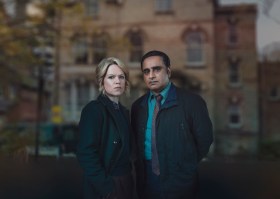What’s this?
As per the documentary’s website:
In the 1850s, Melbourne was the fastest growing city in the world. ‘They dreamt big, they built big … it was a city jumping out of its skin’.
It became an epicentre of film culture and its hotels, restaurants and cafes became world renowned. However, the attempted ‘modernisation’ of Melbourne in the 1950s destroyed much of the city, including its elegant cinemas and picture palaces. Our buildings were deemed too Victorian, the opposite of a modern metropolis, and Whelan The Wrecker’s demolition blitz began.
Featuring rare archival film & photography, this film is a revelatory work that allows its audience to reimagine the former glory of the lost city of Melbourne.
Who directs?
Gus Berger, who also directed Duke Vin and the Birth of Ska (2008).
I’d love to read an interview with Mr Berger about this project – is there one on ScreenHub?
You’re in luck! Here’s a snippit:
During the lockdown, my little cinema here in Thornbury was one of the first businesses to close. And once I’d dealt with the shock of hibernating the business, I realised that I suddenly had time on my hands to dive back into new projects. I also felt that being creative was an important way for me to cope mentally throughout the pandemic and the lock downs.
I spend a lot of time going through the State Library of Victoria’s photographic archives, and once I’d gone through the photos of cinemas and theatres, I started looking at the street scenes of Bourke Street at the turn of the century, like 1900-1910, and was just fascinated by the bustling and busy Bourke Street, Collins Street and Elizabeth Street that had been so incredibly well-documented by the photographers. At the same time, I was coming across a whole lot of photographs of these incredible buildings, like hotels and markets that weren’t standing anymore – including skyscrapers, the Australia building, Prells Tower, the APA building – and I was like, ‘what’s happened to these buildings? Why did we lose these incredible structures?’
Interview: Achieving the impossible with Gus Berger
Is there a trailer?
Do the critics like it?
Stephen A Russell certainly did, writing for ScreenHub, and to date his is the only review on Rotten Tomatoes. Here’s some of what he wrote:
A labour of love, director Gus Berger crafted this tribute to filmic temples lost to oblivion – AKA mostly Whelan The Wrecker demolition company – while his own palaces, the Thornbury Picture House and Blow Up Cinema, were closed during lockdowns. Painstakingly put together with heaps of sumptuous archival footage summoned from the National Film and Sound Archives, it’s both a heartbreaking tribute to what was lost and also saved, like the Yarraville Sun and the ornate Regent Theatre (even if it’s no longer a cinema).
The 10 best Australian films of 2022 … maybe
Don’t say
[in a sarcastic voice] At least we still have Fed Square.

Do say
[with a tone of steadfast civic pride] At least we still have Fed Square.

Where and when can I watch it?
The Lost City of Melbourne premieres on 6 July on DocPlay





